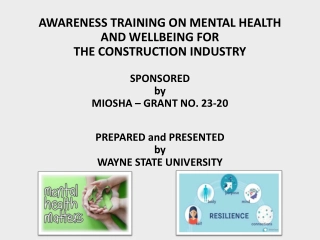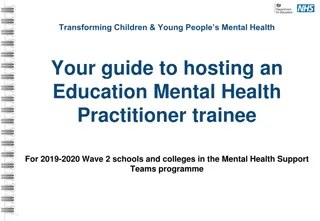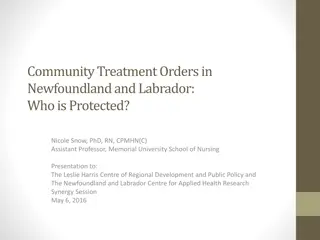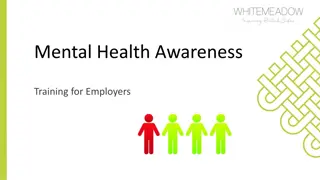
Understanding Mental Health Support
This practical guide offers tips on how to support your own and others' mental health. Learn about mental health, signs of poor mental health, and ways to start conversations. Discover valuable insights to help those experiencing mental health problems.
Download Presentation

Please find below an Image/Link to download the presentation.
The content on the website is provided AS IS for your information and personal use only. It may not be sold, licensed, or shared on other websites without obtaining consent from the author. If you encounter any issues during the download, it is possible that the publisher has removed the file from their server.
You are allowed to download the files provided on this website for personal or commercial use, subject to the condition that they are used lawfully. All files are the property of their respective owners.
The content on the website is provided AS IS for your information and personal use only. It may not be sold, licensed, or shared on other websites without obtaining consent from the author.
E N D
Presentation Transcript
> > > A PRACTICAL GUIDE TO SUPPORTING YOUR OWN AND OTHERS MENTAL HEALTH
> > > ABOUT THIS PRACTICAL GUIDE > > > THIS PRACTICAL GUIDE IS DESIGNED TO GIVE YOU WAYS YOU CAN HELP SOMEONE, BE THAT A COLLEAGUE, FRIEND OR FAMILY MEMBER, IF YOU FEEL THEY ARE EXPERIENCING MENTAL HEALTH PROBLEMS. > > > Building Mental Health
WHAT IS MENTAL HEALTH? The definition of mental health covers a wide variety of topics however it is important to remember that we all have mental health. Our mental health is fluid and can be affected by a range of factors both in a positive and negative way. Think about stress for example, we all know what it feels like to be stressed but when that stress becomes too much it may lead to mental health problems. > > > Building Mental Health
> > > Its OK not to be OK Trying to tell the difference between what expected behaviours are and what might be the signs of a mental ill health is not always easy. There are no easy tests that can let someone know if there are mental health problems. HOW CAN I SUPPORT PEOPLE WHO HAVE POOR MENTAL HEALTH? However, common signs may include the following: Lethargy Out of character Closed off Personal appearance Self-care Motivation Mood Talking to someone can potentially be daunting but it is vital that you do if you think someone is experiencing mental health problems. > > > Building Mental Health
MHFA England recommend the following tips to start a conversation however don t get bogged down with these The most important thing is to have the conversation - this could make the difference. 7 TIPS FOR HAVING A CONVERSATION > > > Building Mental Health
1. CHOOSE A SETTING Think about where the person will feel most comfortable and give yourself time as you don t want to look rushed or be interrupted. > > > MHFA Tips
2. THINK ABOUT THE LANGUAGE YOU USE Don t offer insensitive advice such as cheer up and try to keep the chat as positive and supportive as possible. > > > MHFA Tips
3. KEEP QUESTIONS OPEN ENDED Ask empathetic questions such as How are you feeling at the moment? and give them time to answer. The aim is not to bombard them with too many questions but for them to know you are listening. > > > MHFA Tips
4. LISTEN AND DON T JUDGE Respect the persons feelings and experiences even though they may be different to yours. Listen to the words they use, tone of voice and body language, as this will help you understand how they re feeling. > > > MHFA Tips
5. KEEP THE CONVERSATION GOING Reassure them that your door is always open and follow up to ask them how they re doing. Reassure them that there are many sources of support available and encourage them to seek professional help from their GP or local support service. > > > MHFA Tips
6. SUPPORTING SOMEONE IN A CRISIS If someone tells you they are feeling suicidal or if you suspect they are thinking of taking their own life, it is critical to encourage them to get help. Stay calm and stay with them and if you are really concerned, call 999 for advice. > > > MHFA Tips
7. LOOK AFTER YOURSELF Supporting someone who is experiencing mental ill health can be challenging and draining and so it s important to look after your own mental health afterwards. > > > MHFA Tips
Action for Happiness developed the following 10 evidence-based Keys to Happier Living WELLBEING STRATEGIES FOR SELF AND OTHERS If you are supporting someone or you are struggling yourself, try to incorporate these strategies into your daily life. > > > Building Mental Health
10 KEYS 1. GIVING Do things for others - it makes us happier and healthier. 1 > > > Building Mental Health
10 KEYS 2. RELATING Connect with people as those who have strong broad social relationships are happier, healthier, and live longer. 1 > > > Building Mental Health
10 KEYS 3. EXERCISING Take care of your body as being active makes us happier as well as being good for our physical health. 1 > > > Building Mental Health
10 KEYS 4. AWARENESS Be in the moment and pay attention to your emotions as it helps stop us dwelling on the past or worrying about the future. 1 > > > Building Mental Health
10 KEYS 5. TRYING OUT Learning new things gives us a sense of accomplishment and boosts self- confidence and resilience. 1 > > > Building Mental Health
10 KEYS 6. DIRECTION Having ambitious but realistic goals gives our lives direction and brings a sense of accomplishment when we achieve them. 1 > > > Building Mental Health
10 KEYS 7. RESILIENCE Find ways to bounce back from stress and adversity, we cannot always choose what happens, but we can choose our own response to what happens. 1 > > > Building Mental Health
10 KEYS 8. EMOTIONS Positive emotions are great at the time, but if we experience them regularly, they create an upward spiral of positive feelings and energy. Conversely, negative emotions can quickly lead us into a negative spiral. 1 > > > Building Mental Health
10 KEYS 9. ACCEPTANCE Learning to accept ourselves increases our enjoyment of life, our resilience, and our well-being. 1 > > > Building Mental Health
10 KEYS 10. MEANING Be part of something bigger as people who have meaning and purpose in their lives are happier, feel more in control and get more out of what they do. 1 > > > Building Mental Health
Your NFDC is here to help you. Should you need any further help or guidance on how to deal with Mental Health in your workplace call 01442 217144. A 24/7 helpline for all construction workers and their families in the UK. Call 0345 605 1956 Construction Industry Helpline Offers confidential emotional support 24 hours a day. Call 116 123 / www.samaritans.org Samaritans SPECIALIST MENTAL HEALTH SERVICES Provides information on a range of mental health areas from 9am-6pm, Monday to Friday. Call 0300 123 3393 / www.mind.org.uk Mind Provides solution-based guidance. Call 0300 5000927 / www.rethink.org Rethink A helpline staffed by volunteers from 9.30am-5.30pm, Monday to Friday. Call 08444 775 774 / www.anxietyuk.org.uk Anxiety UK Help and information for people dealing with debt problems. Call 0800 138 1111 / www.stepchange.org Step Change www.stepchange.org > > > Building Mental Health






















